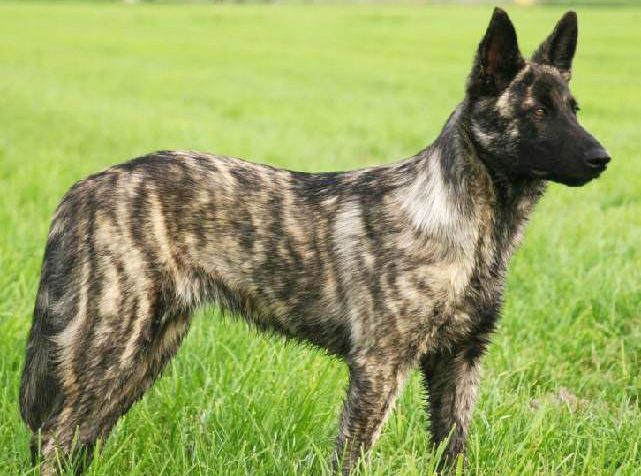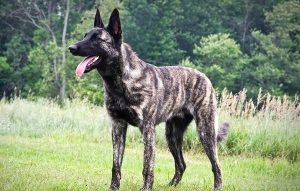The Dutch German Shepherd is a beautiful species that was originally used by shepherds in the Netherlands for agricultural work. Intelligent and highly trainable, today it is often used as a guard dog, police dog, and often as a beloved family companion.
Learn more about the different types of German Shepherd.

Origin of the Dutch German Shepherd
Dutch Shepherds are rarer than many other German Shepherd breeds, they are known to be the healthiest and the easiest to train. They were used for all kinds of tasks on farms in the Dutch countryside.
Origin of your Race
These handsome Dutch German Shepherds were not only capable of herding sheep and other animals, but also they prevented chickens from leaving the gardens, pulled carts and acted as guard dogs.
Now, due to the great development of modern agricultural techniques, these dogs were unnecessary for herding and other agricultural work, and during the Second World War, breeding in the Netherlands stopped.
For this reason, many dogs died of starvation, and some were taken by the German army because they were highly trainable for work in the armed forces. For this reason, nowadays it is not common to see them everywhere as it was before.
Current Situation of the Dutch German Shepherd
After the war, breeders continued the effort to breed Dutch Shepherds and mixed dogs of unknown origin. Although the breed is still rare today, Dutch Shepherds are used for police work, search, rescue, and as guide dog since they are very trainable.
They also compete in dog sports and have retained their herding skills from their farm days.
General Characteristics of the Dutch German Shepherd
This precious animal is undoubtedly a gift of nature. It has characteristics similar to those of the rest of the German shepherds in terms of physical appearance, but not personality:

Fur
Usually they are tabby with various shades of gold and silver. Some may be a light, sandy color, while others may be a shade of red.
Size
Male Dutch Shepherds are slightly larger on average than females. With a stature of 22 to 25 inches, while females are between 21 and 24 inches.
The race tends to weigh around 50 to 70 pounds in weight. While these are considered standard sizes, some individuals of the breed can be larger or smaller.
Personality
Dutch Shepherds are known for their intelligence and comprehensive competence in almost everythingincluding agility, acting as guard dogs, search and rescue, herding, field training, police work, guide dog, and simply as a family companion.
They are highly trainable and eager to please, soaking up new commands like a sponge. This breed requires a confident trainer who can set limits, keep the dogs interested in learning, and build a trusting relationship.
Importance of training

Early socialization training is important and will help them remain calm around new people and pets. The Dutch Shepherd is a quintessential guard dog and usually barks when a stranger enters his territory. This can be beneficial, but also it is important that dogs learn to interact appropriately with guests.
Dutch Shepherds are great with the family, including children and other pets, and they are very affectionate and obedient. However, they will need plenty of exercise, both mentally and physically, to prevent boredom in these beautiful pets.
Health
dutch shepherds they are generally a very healthy breed, in fact it is considered one of the healthiest of this type. There are a few examples of Dutch Shepherds developing hip dysplasia, but these cases are rarer than similar breeds such as pure German Shepherds.
Watch out
As with all dogs, it is of great importance to take the Dutch German Shepherd for regular veterinary check-ups and keep up with any home care recommended by your veterinarian.
- Your nails grow quite quickly and will need to be trimmed as needed to prevent cracking, splitting, or bruising.. Their ears should also be checked at least once a week and any debris or wax buildup removed, as this can lead to infection.
- Teeth should also be brushed regularly. In this case, you can ask the veterinarian for advice on how to carry out these basic care for the optimal care of the dog. Additionally, it is vital to make sure you keep up with the daily exercise needs of the Dutch Shepherd.
- They will need at least one good long walk per day, and maybe a few vigorous play sessions. If they are not stimulated mentally and physically, they can get bored, and distressed until they get sick and die.
Feeding
A Dutch German Shepherd’s diet should be formulated for a medium to large active dog with somewhat high energy levels. A vital tip is to highlight the importance of consult your veterinarian or professional nutritionist for advice on what foods and portions are best for this pet.
Fish oil supplements should also be added to their diet, as this can help keep their coat shiny and skin healthy.
Relationship of this Pet with the family
Dutch Shepherds are quite loyal to their families, including children. They tend to love human beings they are familiar with and will only bark or act aloof towards strangers, making them excellent guard dogs.
Children should, of course, be supervised when playing with this beautiful pet as they should with any dog, to ensure playtime doesn’t get out of hand.
Children should also be trained on how to handle animals properly to avoid incidents. Dutch Shepherds are also usually fine with other dogs and pets.
Early Training
Starting socialization training early can help Dutch Shepherds’ natural friendliness and ensure they remain calm around new people and animals.
